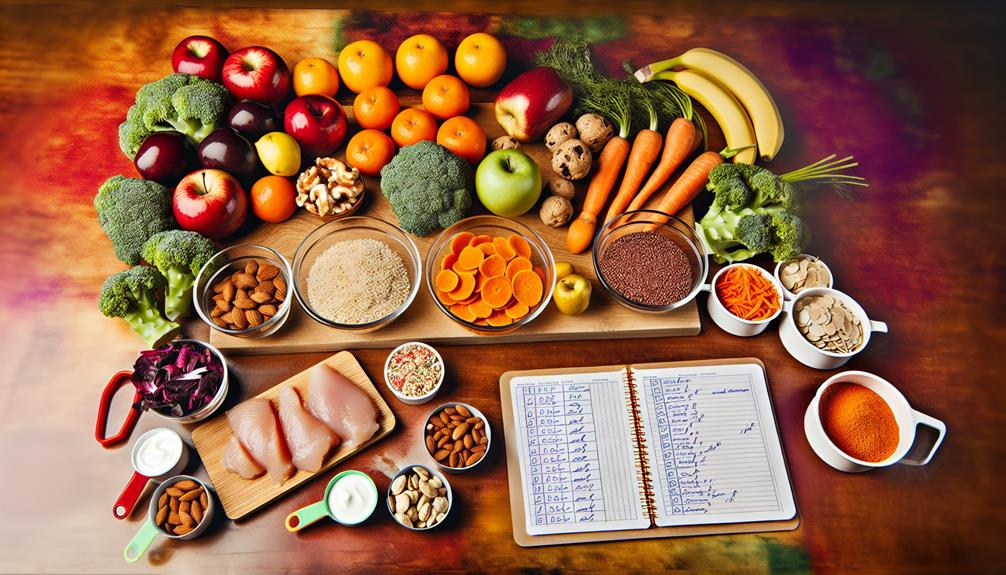You can lose weight naturally in seven days by focusing on whole foods, regular exercise, and healthy habits. Start by planning meals packed with fruits, vegetables, and lean proteins while controlling your portion sizes. Aim for at least 150 minutes of exercise this week, and don't forget to stay hydrated with eight cups of water daily. Prioritize quality sleep and manage stress through mindfulness techniques, which can help reduce emotional eating. By tracking your progress, you'll stay motivated. There are plenty of effective strategies to explore further, so keep going to discover even more tips for success.
Key Takeaways
- Set realistic weight loss goals of 1-2 pounds per week and track your progress regularly.
- Design a meal plan focusing on whole foods, incorporating lean proteins, fruits, and vegetables.
- Practice portion control by using smaller plates and serving individual portions to prevent overeating.
- Engage in regular exercise, aiming for at least 150 minutes of moderate-intensity activity weekly.
- Prioritize hydration and aim for 7-9 hours of quality sleep to support metabolism and appetite regulation.
Setting Realistic Weight Loss Goals

When starting your weight loss journey, it's important to set realistic goals that keep you motivated and on track. Aim to lose 1-2 pounds per week; this is a safe and sustainable rate that minimizes health risks.
Instead of focusing on how to lose weight fast, create a weight loss plan with SMART goals—specific, measurable, achievable, relevant, and time-bound. For instance, determine how many calories per day you'll consume and stick to healthy eating habits.
As you begin this journey, don't forget to track your progress. Regular weigh-ins or measurements help you see how far you've come and adjust your strategy when needed.
Recognize that rapid weight loss can lead to negative health effects, so prioritize your well-being over quick results.
Celebrate milestones, like losing your first 5 pounds. These small victories will keep you motivated and remind you that every step counts.
Also, consider your body mass index (BMI) to set achievable goals that align with your health. Remember, it's about enjoying the journey while working towards freedom and health!
Designing Your Meal Plan

Creating a meal plan plays an essential role in your weight loss journey. By focusing on whole foods, you can enjoy delicious meals while maintaining low calories. Aim for at least five servings of fruits and vegetables daily to guarantee you're nourishing your body. Incorporate lean proteins like chicken, fish, legumes, and tofu; a balanced plate should consist of ½ vegetables/fruits, ¼ lean protein, and ¼ whole grains.
Planning meals ahead helps you prepare healthy options, making it easier to avoid processed foods and added sugars that can sabotage your goals. Here's a simple meal plan template to guide you:
| Meal | Food Choices | Portion Control |
|---|---|---|
| Breakfast | Oatmeal with berries | 1 cup oatmeal, ½ cup berries |
| Lunch | Grilled chicken salad | 4 oz chicken, 2 cups mixed greens |
| Snack | Veggie sticks with hummus | 1 cup veggies, 2 tbsp hummus |
| Dinner | Baked salmon with quinoa | 4 oz salmon, ¾ cup quinoa, 1 cup steamed broccoli |
| Hydration | Water throughout the day | Aim for 8 cups total |
Stay hydrated, manage portion sizes, and enjoy the freedom that comes with a well-structured meal plan!
Incorporating Regular Exercise

Incorporating regular exercise into your routine can really ramp up your weight loss efforts and boost your overall health. Aim for at least 150 minutes of moderate-intensity aerobic activity each week, like brisk walking or cycling. This won't only enhance your calorie burn but also elevate your mood and energy levels.
Don't forget about strength training! Engaging in these exercises at least twice a week helps build lean muscle mass, which can increase your resting metabolic rate and keep those calories burning even when you're not working out.
Consider integrating high-intensity interval training (HIIT) into your regimen. This approach maximizes calorie burn through short bursts of intense activity, making it a time-efficient option for weight loss.
Regular physical activity, whether jogging, swimming, or dancing, can help you burn around 295 calories in just 30 minutes if you weigh 154 pounds. Every little bit counts in creating that caloric deficit you're aiming for.
Lastly, embrace daily physical activities like walking or taking the stairs to reduce sedentary behavior. Your body craves movement, so give it the freedom to thrive through regular exercise!
Understanding Portion Control

Mastering portion control can greatly impact your weight loss journey, helping you avoid overeating and make healthier choices. Start by serving food on individual plates instead of family-style, which encourages mindful eating and prevents you from mindlessly piling on extra servings.
Using smaller plates tricks your brain into thinking you're eating more, effectively reducing your overall food intake.
Take the time to measure portions with measuring cups or a food scale. This practice helps you better control your calorie intake and establishes healthier eating patterns.
Remember, eating slowly enhances your satiety, allowing you to enjoy your meals while recognizing when you're full. Fast eaters often consume more calories, so savor each bite.
Keeping a food diary can greatly increase your awareness of your food intake and portion sizes. Tracking what you eat not only helps you identify patterns but also supports your efforts in maintaining portion control.
Hydration and Sleep Importance
Staying hydrated and getting enough sleep are essential for your weight loss journey.
Drinking water can boost your metabolism and help you eat less, while quality sleep regulates hormones that control appetite.
Hydration for Weight Loss
Hydration plays a crucial role in weight loss, and it's more effective than you might think. Staying hydrated not only boosts your calorie burn by 24-30% after drinking water but also helps you manage your calorie intake. By replacing high-calorie drinks with good old water, you can remarkably cut down on those sneaky liquid calories that your brain often overlooks.
Here's a simple breakdown of how hydration impacts your weight management:
| Benefit of Hydration | Effect on Weight Loss | How to Implement |
|---|---|---|
| Increases Calorie Burn | Boosts metabolism by 24-30% | Drink water post-meal |
| Reduces Calorie Intake | Lessens hunger cues | Drink water before meals |
| Enhances Workout Performance | Prevents dehydration | Stay hydrated during workouts |
Sleep's Role in Metabolism
Getting enough sleep is essential for maintaining a healthy metabolism and effective weight management. When you skimp on sleep, it disrupts the balance of appetite hormones like leptin and ghrelin, leading to increased hunger and caloric intake.
In fact, sleep deprivation can raise your risk of obesity by 55%.
To harness the power of sleep for weight loss, consider these tips:
- Aim for 7-9 hours of quality sleep each night to regulate your metabolism.
- Establish a consistent sleep schedule to improve energy use and reduce cravings.
- Be aware that poor sleep can lead to consuming an extra 300 calories daily.
Chronic sleep deprivation doesn't just impact your hunger; it also elevates cortisol levels, which can contribute to fat accumulation, especially around your midsection.
Prioritizing sleep can help you manage your weight more effectively by keeping your appetite hormones in check and promoting healthier eating habits.
Managing Sleep Quality
Quality sleep is essential for ideal health and weight management, and managing your hydration levels plays a significant role in achieving it. Aim for 7-9 hours of quality sleep each night. Sleep deprivation can disrupt appetite hormones, increasing your risk of obesity by 55%.
To improve sleep quality, establish a consistent sleep schedule; go to bed and wake up at the same time daily. This supports your body's natural circadian rhythm.
Hydration is important too. Drink enough water throughout the day to avoid dehydration, which can disturb your sleep patterns and lead to increased nighttime awakenings.
Be mindful of your caffeine and alcohol consumption, especially in the hours before bedtime, as both can negatively impact your sleep quality and duration.
To wind down, create a relaxing bedtime routine that includes calming activities like reading or meditation. This signals to your body that it's time to sleep, promoting deeper rest.
Mindfulness and Stress Management

Practicing mindfulness can greatly help you manage emotional eating and make better food choices.
By incorporating mindful eating techniques, like savoring each bite, you'll become more attuned to your hunger cues and reduce unnecessary calorie intake.
Additionally, stress reduction techniques can keep your cortisol levels in check, supporting your weight loss journey.
Managing Emotional Eating
How can you break the cycle of emotional eating? It starts with understanding your triggers and practicing mindfulness. By becoming more aware of your hunger and satiety cues, you can markedly reduce emotional eating. Consider these strategies to regain control:
- Keep a food diary: Tracking what you eat can help you identify emotional triggers and patterns in your eating habits.
- Engage in stress management: Techniques like meditation and deep breathing not only reduce cortisol levels but also help curb cravings for unhealthy foods.
- Incorporate physical activity: Regular exercise is a fantastic way to relieve stress and manage your weight, making it easier to resist binge eating.
Mindful eating is essential in this journey. When you slow down and eliminate distractions during meals, you empower yourself to recognize true hunger and fullness.
This awareness can lead to healthier eating behaviors and better weight management. Remember, the goal isn't just to lose weight but to cultivate a more balanced relationship with food.
Mindful Eating Practices
Mindful eating practices can transform your relationship with food, helping you savor each bite and recognize your body's signals. By focusing on your meals, you'll become more aware of hunger cues and satiety hormones, allowing you to reduce calorie intake naturally.
Slowing down while eating and thoroughly chewing your food can enhance feelings of fullness, leading to greater meal satisfaction and healthier portion perception.
Keeping a food diary is a powerful tool to track your eating habits and spot emotional triggers that may lead to overeating. This awareness empowers you to make conscious food choices rather than succumbing to stress-related eating.
Mindfulness techniques, like meditation or deep breathing, can further support your journey by reducing stress, which is often tied to increased appetite and weight gain.
Stress Reduction Techniques
Reducing stress can greatly impact your weight loss journey, especially when combined with mindful eating practices.
Stress reduction techniques, like mindfulness and physical activities, can help you manage your emotions and make healthier food choices. When you reduce cortisol levels through mindfulness practices, you're less likely to engage in emotional eating.
Here are some techniques you can incorporate into your daily routine:
- Practice mindfulness-based stress reduction: Engage in meditation or deep breathing exercises to enhance your mental clarity and calmness.
- Stay active: Simple physical activities, like walking, can lift your mood and contribute to better weight management.
- Prioritize sleep quality: Aim for restful sleep to combat the increased risk of obesity linked to sleep deprivation.
Tracking Your Progress

Tracking your progress is essential for staying motivated on your weight loss journey. To keep yourself accountable, weigh yourself at the same time each week, ideally in the morning before breakfast. This consistency helps you monitor your progress without being misled by daily fluctuations.
Don't just rely on the scale; take body measurements of your waist, hips, and thighs weekly. These metrics reveal physical changes that may not show up on the scale, especially if you're gaining muscle while losing fat.
Keeping a food diary is another powerful tool. Record your daily caloric intake to identify eating patterns and make necessary adjustments to stay aligned with your goals. Consider using tracking apps to log your exercise and food consumption. These tools boost your accountability and provide valuable insights into your progress over time.
Celebrate small milestones, like losing 1-2 pounds or completing a week of workouts. These victories can reignite your motivation and remind you that every step counts.
Embrace the journey, and let tracking your progress empower you to achieve your weight loss goals naturally and joyfully.
Conclusion
In just seven days, you can kickstart your weight loss journey naturally. By setting realistic goals, designing a balanced meal plan, and incorporating regular exercise, you'll see progress. Don't forget about portion control, staying hydrated, and prioritizing sleep. Managing stress and practicing mindfulness will keep you motivated. As you track your progress, celebrate every small victory. Remember, this is just the beginning—embrace the changes and keep moving forward toward your long-term health goals!

